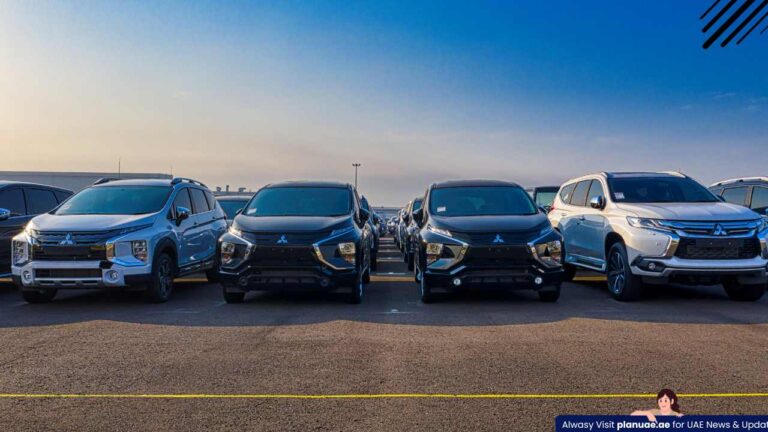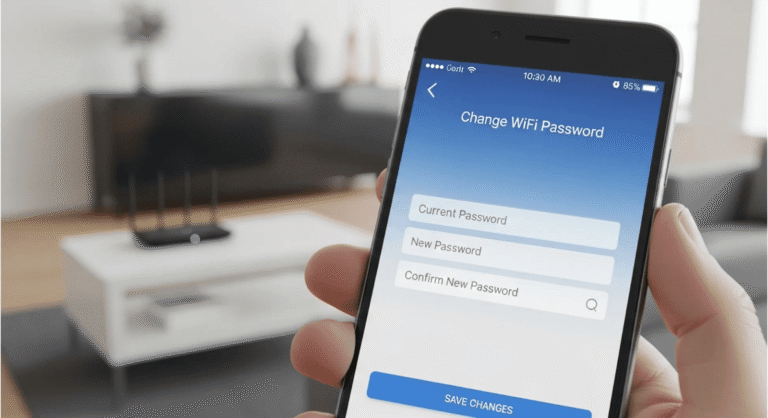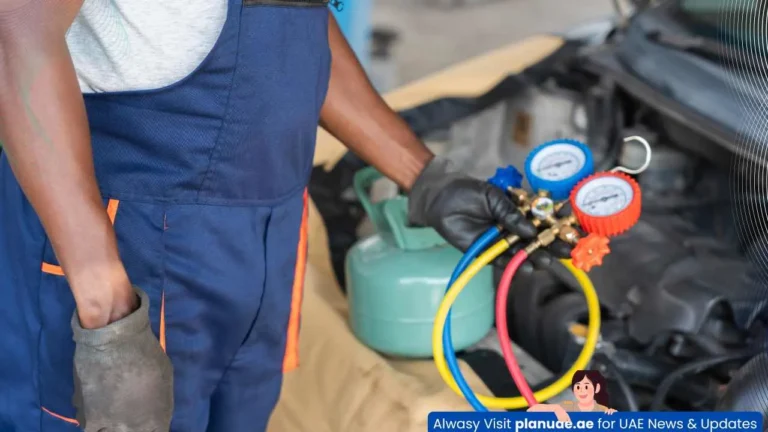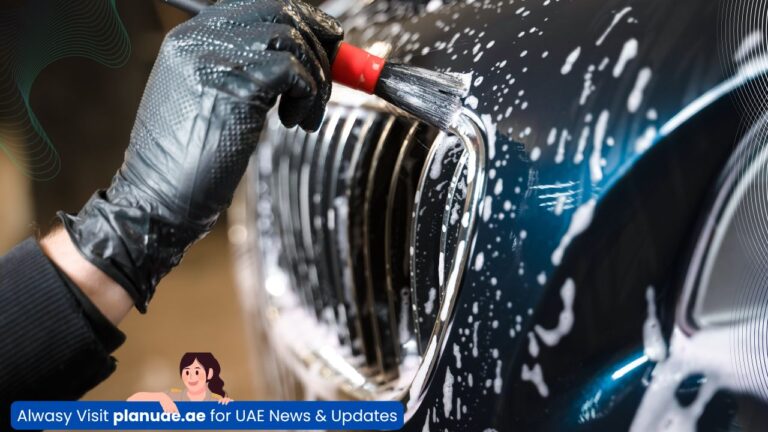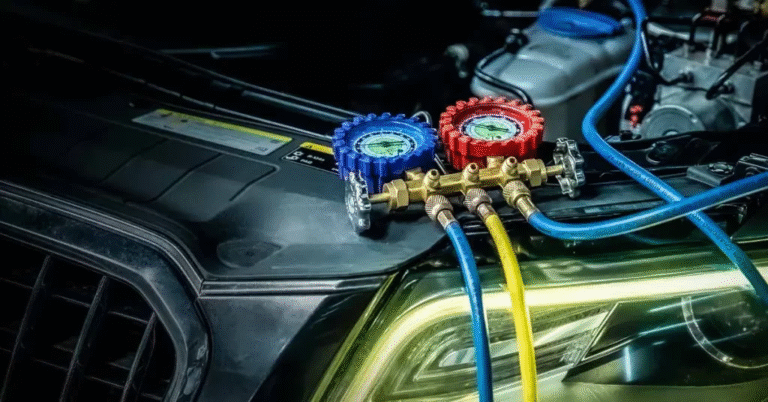Sponsored Article
Your car faces some of the world’s most extreme conditions in the UAE. Summer temperatures regularly hit 45-50°C, while winter mornings in mountainous areas can drop to 10-15°C. Add long-term parking during Eid holidays or summer travels, and your vehicle needs serious seasonal attention.
Many Dubai and Abu Dhabi residents discover their battery has failed after leaving their car parked at the airport for two weeks. Others face overheating on Sheikh Zayed Road during peak summer when their cooling system hasn’t been serviced. These problems are preventable with proper seasonal car care that UAE residents can implement year-round.
Whether you’re preparing for the scorching summer months, the cooler winter season, or planning extended storage while traveling abroad, this guide covers everything you need to know. If you’re facing battery issues, a professional car battery replacement service in Dubai can provide on-site solutions before problems escalate.
Understanding How the UAE’s Seasons Affect Your Vehicle
Summer Heat Impact (May-September)
UAE summers are brutal on vehicles. When ambient temperatures reach 50°C, your car’s interior can climb to 70-80°C when parked in direct sunlight. This extreme heat accelerates battery fluid evaporation and causes internal components to degrade faster.
Your battery works harder during the summer, despite what many people think. Running the AC at maximum capacity while stuck in traffic on Al Khail Road creates massive electrical demand. The alternator struggles to keep up, slowly draining your battery’s charge capacity.
Tire pressure increases by approximately 1-2 PSI for every 10°C temperature rise. Overinflated tires on hot asphalt increase blowout risk, particularly during long drives to Abu Dhabi or Al Ain during peak afternoon hours.
Coolant systems face their biggest test in summer. The radiator must dissipate massive amounts of heat while fighting against scorching ambient temperatures. Any weakness in hoses, the water pump, or the radiator itself becomes critical.
Winter Challenges in the UAE (November-March)
Dubai’s winter is mild compared to many countries, but it still affects your vehicle. Morning temperatures in areas like Arabian Ranches or Al Ain can drop to 12-15°C, which impacts battery performance and engine oil viscosity.
Fog is a serious concern from December through February, especially on roads connecting Dubai to Abu Dhabi. Your wipers, defrosters, and fog lights must function perfectly during these conditions. Reduced visibility makes proper lighting essential for safety.
Occasional rain showers expose weaknesses in your brake system and tire tread. Roads become slippery when rain mixes with accumulated oil and dust, requiring better grip and responsive braking.
Battery voltage drops in cooler temperatures. While not as extreme as in freezing climates, a battery that’s already weakened from summer heat may struggle to start your car during cool winter mornings.
If you need more car repair services you can visit Fixydo which is the best marketplace in UAE. You can rent, place your ad free, ac repair, car mechanic service free submission.
The Long-Term Parking Factor
Residents and expats frequently leave vehicles parked for extended periods. The summer exodus in July-August sees thousands flying to cooler countries for 4-6 weeks. Eid holidays mean week-long trips. Business travelers might leave their cars at Dubai or Abu Dhabi airports for weeks.
A car sitting idle faces different challenges than one driven daily. Batteries self-discharge at approximately 1% per day in moderate conditions, faster in heat. After three weeks, a borderline battery may not start your engine.
Tire flat-spotting occurs when a vehicle sits in one position too long. The weight creates a temporary flat spot on the tire’s contact patch, causing vibration when you first drive.
Fuel can degrade over time, especially in the UAE heat. Water condensation inside the tank becomes possible during temperature fluctuations between hot days and cooler nights.
Preparing Your Car for UAE Summer
Essential Summer Preparation Checklist
Battery Testing and Protection
Your battery is most vulnerable during summer, despite common misconceptions. Heat accelerates the chemical reactions inside the battery, causing faster degradation. The paste on the battery plates can dry out, reducing capacity.
Check your battery’s age first. Most car batteries in the UAE last 2-3 years compared to 4-5 years in moderate climates. If your battery is approaching two years old, have it professionally tested before summer peaks.
Clean the battery terminals thoroughly. Corrosion appears as white, blue, or green deposits around the connection points. This buildup increases resistance and can prevent proper charging.
Ensure the battery is securely mounted. Vibration from loose mounting causes internal damage and shortens battery life. Check that the hold-down clamp is tight.
Consider battery insulation kits designed for extreme heat. These reduce temperature exposure and can extend battery life by several months.
Cooling System Service
Your cooling system is critical for summer survival. Start by checking coolant levels when the engine is completely cold. The reservoir should show fluid between the MIN and MAX marks.
Inspect the coolant’s condition. Fresh coolant appears bright green, yellow, or orange depending on type. Brown or rusty coolant indicates contamination and reduced effectiveness.
For UAE conditions, use high-quality coolant formulated for extreme heat. G12++ coolant offers superior protection in temperatures exceeding 40°C. Mix it 50/50 with distilled water for optimal performance.
Check all hoses connected to the radiator and engine. Look for cracks, bulges, or soft spots that indicate imminent failure. Squeeze hoses to test flexibility – they should feel firm but pliable, not hard or mushy.
Inspect the radiator fins for debris, sand, or bug accumulation. Use compressed air to clean between the fins carefully. Blocked airflow reduces cooling efficiency significantly.
Have the radiator cap tested. A faulty cap fails to maintain proper system pressure, lowering the coolant’s boiling point and risking overheating.
AC System Servicing
Your AC isn’t a luxury in Dubai or Abu Dhabi – it’s essential for safety. A malfunctioning AC in 50°C heat creates dangerous conditions, especially with children in the vehicle.
Start with the cabin air filter. This filter removes dust and pollutants, but clogs quickly in dusty UAE conditions. Replace it every 6 months or 10,000 kilometers, whichever comes first.
Check for weak airflow or warm air from the vents. These symptoms indicate low refrigerant, a failing compressor, or blocked condenser coils.
Listen for unusual noises when the AC runs. Grinding, squealing, or clicking sounds suggest bearing problems or a failing compressor clutch.
Have refrigerant levels checked professionally. Overcharging is as problematic as undercharging. Both conditions reduce cooling efficiency and can damage the compressor.
Clean the condenser located in front of the radiator. Sand and debris block airflow, making your AC work harder and reducing its lifespan.
Tire Inspection and Pressure Management
Hot asphalt on Dubai roads can reach 70°C during peak afternoon hours. Your tires bear this stress every time you drive.
Check tire pressure early in the morning before driving. This gives you a “cold” reading unaffected by heat buildup. Use the pressure specification in your owner’s manual or the sticker inside the driver’s door frame.
Don’t rely on the maximum PSI stamped on the tire sidewall – that’s not your target pressure. Inflate to the manufacturer’s recommended PSI for your vehicle’s weight and load.
Inspect tread depth using a simple tread depth gauge. UAE regulations require a minimum 1.6mm depth, but 3mm is safer for summer rain. Worn tires lose grip on hot pavement and hydroplane more easily in sudden rain.
Examine sidewalls carefully for cracks, bulges, or cuts. UV damage from intense sunlight degrades rubber over time. Any bulge indicates internal damage requiring immediate tire replacement.
Consider the tire’s age. Rubber degrades in the UAE heat even without driving. Replace tires older than 5 years regardless of tread depth. The manufacturing date appears on the sidewall as a 4-digit code (example: 2319 means the 23rd week of 2019).
Rotate tires every 8,000-10,000 kilometers to ensure even wear. This extends tire life and maintains consistent handling.
Protecting the Exterior and Interior
Park in covered or shaded areas whenever possible. If you work in JLT, Marina, or Business Bay, seek parking garages over outdoor spots. The temperature difference can be 15-20°C.
Use a windshield sunshade every time you park. These reflective shields prevent the dashboard from cracking and reduce interior temperature by up to 15°C.
Apply quality wax or ceramic coating before summer. This creates a protective barrier against UV damage and makes sand removal easier after sandstorms.
Keep windows slightly cracked (5-10mm) if parked in a safe, covered area. This allows hot air to escape and reduces interior temperature buildup. Don’t do this in public parking where security is a concern.
Use seat covers on leather seats. Leather can become hot enough to burn skin in direct sunlight. Breathable cotton or mesh covers protect the material and stay cooler.
Clean your car regularly during the summer. Sand and dust act like sandpaper on the paint. Frequent washing removes abrasive particles before they cause damage.
Winter Car Preparation in the UAE
Winter Maintenance Checklist
Battery Performance in Cooler Weather
While UAE winters are mild, the temperature drop still affects battery performance. A battery weakened by summer heat may struggle during cool winter mornings.
Test your battery’s voltage using a multimeter. A fully charged battery should read 12.6 volts or higher when the engine is off. Readings below 12.4 volts indicate the battery needs charging or replacement.
Check the battery’s cold cranking amps (CCA) rating. This measures the battery’s ability to start your engine in cold conditions. Even in the mild UAE winter, proper CCA ensures reliable starts.
Clean terminal connections thoroughly. Corrosion builds faster in humid coastal areas like Dubai Marina or Jumeirah. Poor connections cause starting problems, incorrectly diagnosed as battery failure.
Wiper Blade Replacement
UAE summer heat destroys wiper rubber quickly. Blades become hard, cracked, and ineffective after just 6-8 months of sun exposure.
Test your wipers before winter fog season starts. They should clear water in one smooth stroke without streaking, skipping, or leaving gaps.
Replace blades showing any cracks, stiffness, or ineffective cleaning. Quality blades cost AED 40-80 for a set but provide crucial visibility during fog or rain.
Refill the washer fluid with a quality formula. Some products include anti-fog properties useful during humid winter mornings.
Clean your windshield thoroughly with glass cleaner. Remove all accumulated dirt, sand, and insect residue. This improves wiper effectiveness significantly.
Fog Light and Visibility Systems
Fog is common on roads between Dubai and Abu Dhabi during the winter months, particularly early mornings and late evenings.
Test all fog lights before winter. Front fog lights should emit a wide, low beam that illuminates the road without reflecting back from the fog.
Inspect rear fog lights. These bright red lights help vehicles behind you see your car in heavy fog. Ensure they activate with the switch and turn off when not needed.
Check your defroster and demister systems. These remove condensation from windows during humid conditions. Turn on the system and verify it clears Windows effectively.
Test your headlights on both high and low beams. Clean the lenses with a proper headlight restoration kit if they appear hazy or yellowed. Poor lighting is dangerous in fog and can result in RTA fines.
Replace any burnt-out bulbs immediately. Keep spare bulbs in your vehicle for emergencies.
Brake System Inspection
Rain makes roads slippery, especially when it first falls and mixes with accumulated oil and dust.
Have your brake pads and rotors inspected professionally. Worn brakes require longer stopping distances, particularly dangerous in wet conditions.
Check brake fluid levels and condition. The fluid should be clear, not dark brown. Contaminated brake fluid reduces braking performance and can damage system components.
Test your brakes in a safe area. They should respond smoothly without pulling to one side, making grinding noises, or feeling spongy.
After driving through rain or puddles, gently press the brake pedal a few times while driving slowly. This dries the brake rotors and restores full braking power.
Heater and Climate Control
Your heater may seem unnecessary in Dubai, but it’s essential for defrosting windows during humid winter mornings in areas like Arabian Ranches or Al Ain.
Test the heating function before winter. The system should blow warm air within a few minutes of starting the engine.
Check that air flows through all vents properly. Blocked vents reduce defrosting effectiveness and keep windows foggy.
Inspect cabin air filters. These filter the air entering your vehicle and need replacement every 6 months in dusty UAE conditions.
Long-Term Parking and Storage Preparation
Before You Leave: Pre-Storage Checklist
Battery Management for Extended Parking
Your battery is the most vulnerable component during long-term storage. It self-discharges continuously, faster in hot conditions.
- For storage up to 2 weeks, simply ensure your battery is fully charged before parking. Turn off all accessories, lights, and ensure doors are properly closed.
- For storage 2-4 weeks, consider disconnecting the negative battery terminal. This prevents parasitic drain from the alarm system, clock, and computer memory. Note that you’ll need to reset your radio presets when reconnecting.
- For storage exceeding 4 weeks, use a battery tender or trickle charger. These devices maintain optimal charge without overcharging. They’re essential if you’re traveling for the entire summer or multiple months.
Connect the trickle charger according to the manufacturer’s instructions. Plug it into a standard outlet in your parking space. The charger automatically monitors and maintains your battery.
If you can’t use a trickle charger, have someone start your car and drive it for 20-30 minutes every two weeks. This charges the battery and circulates fluids through the engine.
Fuel Tank Management
Fuel degrades over time, especially in the UAE heat. It can develop varnish deposits that clog fuel injectors and filters.
Fill your fuel tank completely before storage. A full tank minimizes air space, reducing water condensation inside the tank.
Add a fuel stabilizer if storing for more than one month. This additive prevents fuel degradation and keeps it fresh for up to 12 months. Follow the product’s mixing instructions carefully.
Avoid parking with less than half a tank. The empty space allows more condensation, leading to water contamination in your fuel system.
Tire Care During Storage
Tires develop flat spots when a vehicle sits idle for extended periods. The weight creates a depression at the contact point.
Inflate tires to the maximum PSI listed on the sidewall before storage. This higher pressure helps prevent flat-spotting. Remember to adjust to normal pressure when you return.
If storing for more than 3 months, consider placing the vehicle on jack stands. This completely removes weight from the tires. Ensure you follow proper safety procedures and place stands on solid mounting points.
Place cardboard or plywood under tires if parking on dirt or grass. This barrier prevents moisture absorption into the tire rubber.
Move the vehicle slightly every 2-3 weeks if possible. Rolling the tires just a meter changes the contact point and prevents flat-spotting.
Interior and Exterior Preparation
Park in covered or underground parking when possible. Facilities in Al Quoz Industrial Area and near Dubai airports offer climate-controlled storage options for AED 850-2,200 monthly, depending on vehicle type.
If covered parking isn’t available, use a quality weatherproof car cover. This protects against sun damage, sand accumulation, and bird droppings. Ensure the cover fits properly and is secured against wind.
Clean your car thoroughly before storage. Remove all food items, trash, and personal belongings. Food attracts pests, and organic materials can develop mold in high humidity.
Leave windows slightly cracked (3-5mm) if parked in a secure, covered location. This allows air circulation and prevents musty odors. Don’t do this in public outdoor parking.
Place moisture absorbers inside the vehicle. Silica gel packets or commercial moisture absorbers prevent mold and mildew during humid periods.
Avoid using the parking brake for extended storage, especially in older vehicles. The brake shoes or pads can seize against the drums or rotors. Use wheel chocks or place the transmission in Park (automatic) or gear (manual).
Apply a light coating of wax before storage. This protects the paint from dust and makes cleaning easier when you return.
Vehicle Documentation
Ensure your car registration and insurance remain current throughout storage. Driving with expired documents when you return carries hefty RTA fines.
Take photos of your vehicle’s condition before storage. Document any existing scratches or damage. This creates a record if you’re using commercial storage facilities.
Leave emergency contact information with building security or your storage facility. They can reach you if any issues arise with your vehicle.
Duration-Based Storage Guidelines
1-2 Weeks Storage
Short-term parking requires minimal preparation. Simply ensure your battery is charged, park in shade if possible, and set your car alarm.
Remove any valuables from sight. Lock all doors and windows properly.
1-3 Months Storage
Standard storage protocol applies. Follow all battery management steps, including disconnecting terminals or using a trickle charger.
Inflate tires to maximum PSI. Add fuel stabilizer to a full tank.
Clean your vehicle inside and out. Use moisture absorbers inside.
If parking at Dubai or Abu Dhabi airport long-term lots, choose covered parking options. The extra cost is worth the protection.
3+ Months Extended Storage
Extended storage requires comprehensive preparation. Use a trickle charger without exception.
Consider jack stands to remove weight from tires. Change engine oil and filter before storage – used oil contains contaminants that can damage your engine during long periods of inactivity.
Apply extra wax protection to the exterior. Cover the vehicle even in covered parking.
Have someone start and drive your car for 30 minutes every 3-4 weeks if possible. This circulates fluids, charges the battery, and prevents seal degradation.
Consider professional storage facilities offering climate control and regular maintenance checks. These services in areas like Al Quoz include weekly inspections, monthly engine starts, and car washing.
Seasonal car care that Dubai residents implement before travel prevents most storage-related problems. Professional pre-storage inspections identify potential issues.
Returning to Your Car After Storage
Post-Storage Restart Protocol
Visual Inspection First
Walk around your vehicle before attempting to start it. Look for any obvious damage, flat tires, or signs of pest infestation.
Check under the car for fluid leaks. Look for puddles or stains indicating coolant, oil, or other fluid issues.
Inspect the tires for flat spots or low pressure. Use a pressure gauge to check each tire.
Battery Check and Jump-Start Procedures
If you disconnected the battery, reconnect the negative terminal first, then the positive. Ensure connections are tight.
Try starting the engine normally. If the battery is too weak, you’ll hear clicking sounds or nothing at all.
Use jumper cables if needed. Connect positive to positive, negative to a ground point on the dead vehicle (not directly to the battery’s negative terminal).
Let the working vehicle run for 5-10 minutes to charge the weak battery before attempting to start.
Once started, let your engine run for at least 20-30 minutes. This allows the alternator to recharge the battery.
Fluid Level Verification
Check all fluid levels before driving. Coolant, engine oil, brake fluid, power steering fluid, and washer fluid should all be at proper levels.
Look for any fluid loss during storage. Significant drops indicate leaks requiring immediate attention.
Tire Pressure Adjustment
Adjust tire pressure to normal specifications if you inflated them to maximum PSI before storage.
Take a short, slow test drive in your parking area. Listen for any unusual noises and feel for vibrations.
Flat-spotted tires may vibrate initially but often improve after driving a few kilometers as they warm up and reshape.
When Professional Help Is Needed
Dead Battery Scenarios
If your battery won’t hold a charge after jump-starting or shows signs of physical damage, replacement is necessary.
Batteries weakened by heat often fail completely after storage periods. Don’t risk getting stranded – have the battery tested professionally.
Mobile battery services are ideal for post-storage situations. Technicians come to your location, test your battery, and replace it on-site if needed.
Other Common Post-Storage Issues
Brake pedals may feel spongy after extended storage. Pump the brakes several times before driving to restore pressure.
Unusual smells when starting might indicate pest nests in the engine bay or HVAC system. Check air filters and vents.
Warning lights on the dashboard require diagnostic scanning. Don’t ignore these indicators.
Difficulty starting or rough running suggests fuel system issues. Old fuel may need draining and fresh fuel added.
Professional mobile services save time when dealing with post-storage problems. On-site diagnostics and repairs get you back on the road quickly.
Month-by-Month Seasonal Care Calendar for the UAE
April-May: Pre-Summer Preparation
Temperatures rise rapidly in April, reaching 35-40°C by May. This is your window to prepare before peak summer.
- Schedule comprehensive battery testing. Replace batteries older than 2 years before they fail in summer heat.
- Have your cooling system flushed and refilled with high-quality coolant formulated for GCC conditions.
- Service your AC system. Recharge refrigerant, replace cabin filters, and check compressor function.
- Apply protective wax or ceramic coating to your exterior paint.
June-August: Peak Summer Maintenance
These are the hottest months with temperatures consistently above 45°C. Extra vigilance prevents breakdowns.
- Check coolant levels weekly. Top up if needed with the proper coolant-water mixture.
- Monitor battery performance closely. Slow cranking or dim lights indicate battery weakness.
- Inspect tire pressure twice weekly. Hot roads cause pressure increases – adjust to maintain proper PSI.
- Clean cabin air filters monthly during peak dust season.
- Park in covered areas whenever possible. Shopping at Dubai Mall or Mall of Emirates? Use covered parking even if it costs extra.
- Many residents travel abroad during July-August. Follow long-term storage protocols if leaving for more than two weeks.
September-October: Transition Period
Temperatures begin dropping from 45°C to 35°C during these months. This transition period requires different attention.
- Have your battery retested. Summer heat may have weakened it before winter demands kick in.
- Check all fluid levels that may have dropped during the summer. Top up as needed.
- Inspect belts and hoses. Summer heat causes rubber degradation. Replace any showing cracks or wear.
- Test your heater and defroster before winter fog season. Now is the time to fix problems, not during November fog.
November-February: Winter Maintenance
UAE winter brings cooler mornings (12-18°C) and occasional rain, fog, and humidity.
- Replace wiper blades degraded by summer sun. Test them thoroughly before the first rain.
- Check tire tread depth for adequate grip in wet conditions. Replace worn tires before the rainy season.
- Test all lights, including fog lights. Clean lenses to maximize visibility.
- Monitor battery voltage during cool mornings. Weak batteries struggle more in temperature drops.
- Keep brake systems in top condition for rain. Have pads and rotors inspected if you hear grinding or squealing.
March: Spring Preparation
March bridges winter and summer with pleasant 25-30°C temperatures. Use this month for thorough maintenance.
- Complete any deferred winter maintenance. Fix small issues before summer heat amplifies them.
- Deep clean your vehicle’s exterior and interior. Remove accumulated dust and sand from winter.
- Inspect cooling system components. Replace worn hoses before summer heat causes failure.
- Schedule early AC servicing. Beat the rush as everyone else waits until May.
This calendar helps you stay ahead of seasonal challenges rather than reacting to problems. Regular maintenance following the UAE’s unique climate patterns prevents most breakdowns and extends vehicle life.
Common Mistakes to Avoid
Neglecting Battery Before Travel
The most common mistake UAE residents make is assuming their battery will survive weeks or months of storage without preparation. Heat-damaged batteries appear functional but fail quickly when left idle.
Always test your battery before extended trips. Testing takes 15 minutes and costs far less than a replacement plus emergency service calls.
Using Handbrake During Extended Storage
Many drivers apply the parking brake when storing vehicles. In older cars or humid conditions, brake shoes can seize against drums, or pads can stick to rotors.
Use wheel chocks or leave the transmission in Park instead. Save the parking brake for regular driving.
Ignoring Coolant During “Mild” Winter
Some drivers assume coolant is only important during summer. However, proper coolant concentration prevents corrosion year-round and ensures optimal heat transfer in all conditions.
Coolant degrades over time. Replace it according to your vehicle’s maintenance schedule, not just when problems occur.
Parking in Direct Sun During Summer Storage
Leaving your car in uncovered parking at Dubai or Abu Dhabi airports during summer trips subjects it to extreme conditions unnecessarily. Interior temperatures can reach 80°C, accelerating the degradation of everything inside.
Always choose covered parking for storage lasting more than a few days. The additional AED 200-400 cost protects thousands of dirhams worth of vehicle components.
Overlooking Tire Age
Many focus only on tread depth while ignoring tire age. Rubber degrades chemically in the UAE heat even without driving. Tires older than 5 years become unsafe regardless of appearance.
Check the manufacturing date on your tire sidewalls. Replace aging tires before they fail catastrophically.
Skipping AC Service
Some residents delay AC service to save money, suffering through reduced cooling. A struggling AC forces the system to work harder, increasing fuel consumption and risking expensive compressor failure.
Regular AC maintenance costs AED 300-600 but prevents AED 3,000-5,000 compressor replacements.
Filling Fuel Tank Partially Before Storage
Leaving your tank half-empty during storage allows air and moisture inside. Temperature fluctuations cause condensation, leading to water contamination in your fuel system.
Always fill the tank completely before storage. Add fuel stabilizer for storage exceeding one month.
Using the Wrong Coolant Type
Not all coolant is created equal. Using standard coolant in the UAE’s extreme heat provides inadequate protection. Some coolant types are incompatible with your vehicle’s engine materials.
Always use the coolant specified in your owner’s manual. For most vehicles in the UAE, G12++ long-life coolant offers superior protection in extreme heat.
FAQs
How long can I park my car without starting it in Dubai?
Without any preparation, you can safely park for up to one week without issues in mild weather. Your battery will self-discharge slowly, but it should start the engine.
For 2-4 weeks, disconnect the battery negative terminal to prevent parasitic drain. Inflate tires to maximum PSI and park in covered areas.
Beyond one month, use a trickle charger without exception. Add fuel stabilizer and follow complete long-term storage protocols.
During summer months, reduce these timeframes by 30-40% due to accelerated battery discharge in heat.
What temperature should I set my AC at in the Dubai summer?
Set your AC to 22-24°C for optimal balance between cooling and fuel efficiency. Lower temperatures force your AC to work harder, increasing fuel consumption and battery drain.
When you first enter a hot car, set the temperature to maximum cooling and the fan speed to high. Open windows briefly to expel hot air. Close windows after 2-3 minutes and switch to recirculation mode.
Once the cabin cools, adjust to 23°C and normal fan speed for comfortable, efficient cooling.
Do I need winter tires in the UAE?
No, standard all-season tires work well for most UAE driving. Winter tires designed for snow and ice aren’t necessary unless you frequently visit mountain areas during winter.
However, ensure your all-season tires have adequate tread depth for occasional rain. UAE regulations require a minimum of 1.6mm, but 3mm provides better wet-weather grip.
Replace tires showing any cracking or aging, regardless of tread depth. UAE heat degrades rubber faster than moderate climates.
How often should I check my coolant in the UAE summer?
Check coolant levels every 2-3 weeks during June-August when temperatures exceed 45°C. Always check when the engine is completely cold to avoid burns.
If you notice coolant levels dropping frequently, you have a leak requiring immediate repair. Don’t just keep adding coolant – find and fix the source.
Replace coolant completely every 2-3 years or according to your vehicle manufacturer’s schedule, whichever comes first.
What’s the best way to prepare my car for the Eid holiday travel?
Start preparations two weeks before traveling. Have your battery tested professionally – don’t assume it’s fine because your car starts normally.
Service your cooling system and AC. Check tire condition and pressure. Fill your fuel tank and add stabilizer if leaving for more than one week.
Disconnect the battery negative terminal or use a trickle charger for trips exceeding two weeks. Park in covered areas if available.
Clean your car inside and out. Remove all food and valuables. Place moisture absorbers inside.
What should I keep in my car for UAE emergencies?
Essential items include: bottled water (5-10 liters), phone charger and cable, flashlight with extra batteries, basic first aid kit, reflective warning triangle, jumper cables, tire inflator or pump, spare tire with jack and wrench, small fire extinguisher, sunscreen, and hat.
For summer, add extra water, electrolyte drinks, and a light blanket (useful for shading if stuck in the sun). Keep these items in a container in your trunk.
Update water bottles every few months. Heat degrades plastic and affects water quality over time.
What happens if I ignore seasonal car maintenance?
Neglecting seasonal maintenance leads to predictable problems. In summer, you risk engine overheating, battery failure, tire blowouts, and AC system failure.
These aren’t just inconveniences. Being stranded on Sheikh Zayed Road in 50°C heat is dangerous, especially with children or elderly passengers.
Winter neglect leads to dead batteries on cold mornings, brake failure in rain, visibility problems in fog, and accident risk.
Maintenance costs are minimal compared to breakdown repairs and safety risks. Regular care following the UAE’s climate patterns prevents most problems entirely.
Is it normal for my tire pressure to increase in summer?
Yes, tire pressure increases as temperatures rise. For every 10°C temperature increase, tire pressure rises approximately 1-2 PSI.
This is why you should check pressure when tires are cold – before driving or at least 3 hours after driving. Morning checks provide the most accurate readings.
Don’t over-inflate thinking you’re compensating for heat. Set pressure according to your vehicle manufacturer’s specifications. The tire management system adjusts naturally for temperature variations.
However, monitor pressure more frequently in summer. Extreme overinflation from heat plus normal pressure can lead to blowout risk.
My Experience with Seasonal Car Care
Last summer, I made the mistake of not properly preparing my car before a month-long trip overseas. I parked at Dubai Airport, assuming everything would be fine since I’d only be gone four weeks.
When I returned, my battery was completely dead. The car wouldn’t even click when I turned the key. I ended up calling Battery Zone UAE, a battery replacement service provider, to get back on the road.
The technician explained that summer heat plus one month of sitting had drained my battery beyond recovery. He tested it and found it was already weak from heat damage I hadn’t noticed. If I’d tested it before traveling, I could have replaced it proactively instead of dealing with the stress of being stranded at the airport parking lot after a long flight.
Since then, I always get my battery tested with Battery Zone UAE before any trip longer than two weeks. I also use their mobile services – they come to wherever your car is parked and handle everything on-site, which is incredibly convenient, especially after dealing with that airport situation.
Final Thoughts
Seasonal car care for UAE residents isn’t optional – it’s essential for vehicle longevity and your safety. The extreme temperature swings between 50°C summer peaks and 12°C winter mornings create unique challenges that nowhere else in the world experiences.
Your vehicle faces intense UV exposure, abrasive sand, temperature extremes, and heavy AC demands. Add long-term storage during travel periods, and the complexity increases dramatically.
The good news? Following the seasonal calendar and checklists in this guide prevents virtually all common problems. Monthly checks take minimal time but save thousands in repairs and prevent dangerous roadside breakdowns.
Whether you’re in Dubai, Abu Dhabi, Sharjah, or any other emirate, your car deserves the same attention you give to surviving UAE summers yourself. Prepare properly, maintain consistently, and your vehicle will serve you reliably for years despite the extreme conditions.
Start with your battery and cooling system – these are the two most critical components for UAE conditions. Everything else builds from there.


